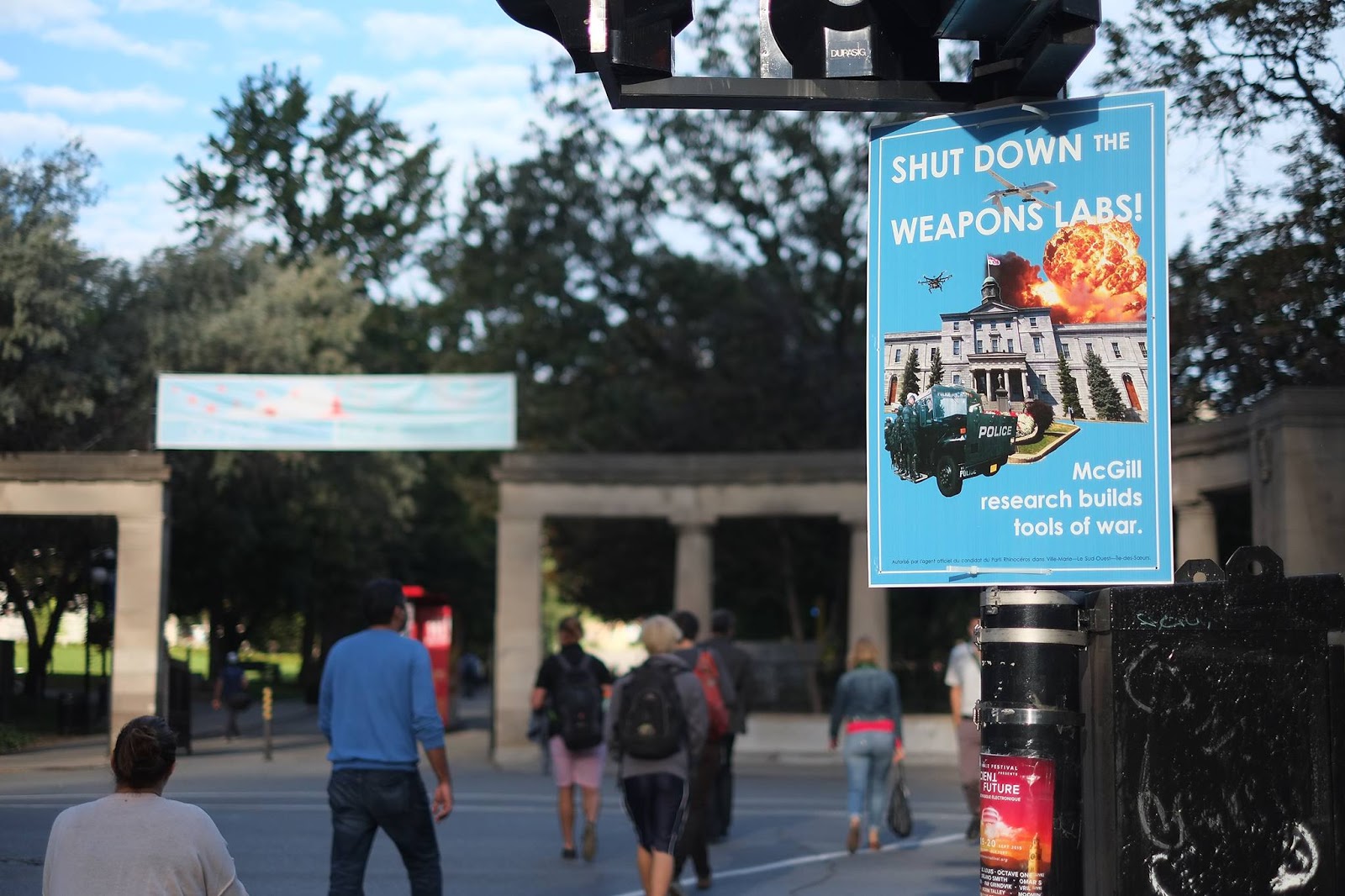Like this article? rabble is reader-supported journalism. Chip in to keep stories like these coming.
On June 21 and 22, Cadence O’Neal, a recent graduate of McGill University involved with Demilitarize McGill, will appear before the Commission on Access at the Palais de Justice in Montreal in an ongoing legal battle with McGill over access to correspondence between McGill researchers and multiple military contractors.
Next week’s hearings are the first two in a five-day hearing in which the Commission will determine if McGill is legally required to turn the emails over to O’Neal.
O’Neal has been involved in a legal dispute with McGill for four years over an access to information request (ATI) that turned up 8,944 email exchanges between McGill’s Computational Fluid Dynamics (CFD) Laboratory and private weapons contractors.
O’Neal believes the email exchanges will contain information related to the CFD’s collaboration with weapons companies crucial to the Demilitarize McGill campaign.
“If this case determines that you can’t access information from a public body that’s also held by a third party then that has really wide-reaching implications,” O’Neal told rabble in a phone interview.
Four years of legal dispute
O’Neal filed the original ATI request during her first semester at McGill in 2012.
Shortly after filing the ATI, McGill responded to O’Neal and 13 other students who had individually submitted similar requests saying that the university was challenging their right to the documents. McGill argued that the students had been working together to “overwhelm university functioning,” O’Neal told rabble in a telephone interview.
The students sought legal representation and argued their case before the Commission on Access, stating that they had submitted the requests as individuals. The Commission ultimately dismissed McGill’s request to refuse the ATI requests and all future requests.
After the first hearing, O’Neal and McGill went into mediation to discuss how to resolve the issue. “Both sides made some concessions,” O’Neal told rabble. O’Neal narrowed down her request, and the Commission set a schedule for McGill to release the email exchanges.
O’Neal told rabble that two years later, “when it came time for McGill to hand over the documents, they said they actually wouldn’t be giving me the emails I requested because of some specific article in the ATI laws they had found.”
Several other students received similar refusals, and issued a complaint to the Commission once again. About nine months ago, O’Neal met with the Commission again to resolve the issue. The Commission decided that a five-day hearing would be necessary to determine whether McGill is legally bound to release the emails.
The hearing was supposed to begin in October 2015, but was postponed by McGill’s lawyers.
8,944 email exchanges
The CFD laboratory in McGill’s Department of Mechanical Engineering conducts research on 3D modeling software for use by the aerospace industry, including anti-icing software for attack drones and flight simulation software for military pilots, according to Demilitarize McGill.
The CFD lab is funded, in large part, by Bombardier, CAE, Bell Helicopter Textron, and Lockheed Martin.
O’Neal speculates that the correspondence is between CFD and the company’s researchers or financial representatives. “In the past we’ve seen that these emails can include very detailed information about the research itself or information about booking travel, it can be any range of things,” O’Neal told rabble.
McGill did not respond to rabble for comments, however, the university had previously told the Montreal Gazette in 2015 that the emails may contain intellectual property or research strategies and the lack of disclosure “does not mean there is something untoward in the research.”
“It does raise red flags to see McGill fighting so hard for so long, and raises the flag to me that the emails likely do contain information that would potentially be useful for the campaign to end military research in universities,” O’Neal said.
McGill views ATI requests as “threats”
McGill treats ATI requests “like threats, as kind of combative actions,” O’Neal said.
While O’Neal and the other students involved in parallel cases are self-represented, “McGill is sparing no expense in its ATI battles, enlisting Lavery lawyer Raymond Doray, well known as an expert in Quebec access-to-information law, to represent it before the Commission. “
This type of response to ATI requests “is really harmful for both the people who have already submitted those requests but also for people looking into the option of submitting ATIs to get information,” said O’Neal.
While she remains unsure as to McGill’s legal strategy for the hearings, she speculates that McGill’s lawyers will argue that the university does not legally hold the emails.
If the Commission rules in McGill’s favour, O’Neal believes that “the outcome of the case could set a precedent for the right of access to communications between public bodies and the private sector, with impacts for activists and journalists alike.”
Sophia Reuss is a Montreal-based writer, editor, and is a recent graduate of McGill University. She’s interested in how online media and journalism facilitate public accessibility and conversation. Sophia also writes and edits for the Alternatives International Journal. She is rabble’s current news intern.
Photo: Jules Tomi/Demilitarize McGill’s Facebook page.




